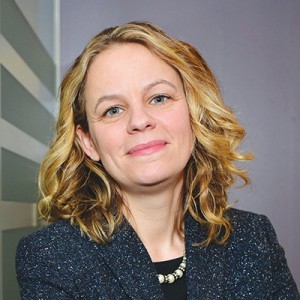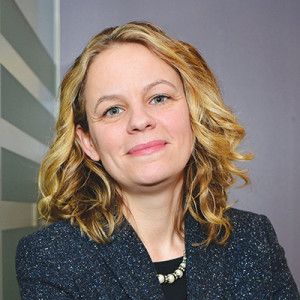A beginner’s guide to Dr Rebecca Allen
Where does she work?
In early 2018 Allen took up a new role as director of the Centre for Education Improvement Science (CEIS) at the Institute of Education (IoE). The Centre focuses on leading path-breaking research about educational system improvement. This encompasses the science of learning and teaching
For three years previously (2015 - 2018), while on sabbatical from her academic post as a reader in the economics of education at IoE, Allen was director of Education Datalab, which specialises in independent research that policymakers can use to inform education policy, and schools can use to improve practice. Before entering academic research, Allen worked in investment banking and then teaching, before going on to complete her PhD at the IoE.
In 2017 Allen, Laura McInerney and Alex Weatherall founded the TeacherTapp app, which gives teachers a voice by asking them three questions each day; generating a valuable real-time insight into their lives.
Quick facts
Nationality: British
Website: www.rebeccaallen.co.uk
Website:: teachertapp.co.uk
Website: https://educationdatalab.org.uk
Twitter: www.twitter.com/drbeckyallen
What is she best known for?
An expert in the analysis of large-scale datasets, such as the National Pupil Database and School Workforce Census, Allen has opted to focus largely on the impact government reforms have on school behaviour. Her interest in quantitative analysis has carried through into her work with Education Datalab and will support her research efforts at CEIS.
What's her work about?
Allen's work is grounded in economic theory. She has explored how policymakers can best decide how much to spend on different stages of education; how to maximise education's benefits to society; and who should have access to each stage of education. She uses normative economic practices to help policymakers consider the facts about education and make informed decisions.
At CEIS Allen will be helping develop a 'scientific understanding' of education, using methods such as classroom observation and laboratory experiments. The Centre's findings will support an evidence-based approach to school improvement - helping inform policymakers, school leaders, teachers and parents about the way chidren learn, how teaching professionals are developed, and how schools are run.
What does she research?
Allen's main research interests lie in the economics of schooling and effect of government policies on school behaviour and performance. Her previous research on school accountability includes studies of school admissions policies, parental choice of school, school accountability, selection by ability and competition between schools.
At Education Datalab Allen's focus was towards a quantitative analysis of the teacher labour market, looking at the early career choices of teachers, how training and first job posts affect their experiences, and career pathways into senior leadership. She has also written about the impact of selection by ability on the distribution of skills and equity. On the former, she claims there is insufficient evidence to come to a firm conclusion. On the latter, she says: "There are quite serious equity arguments against selection by ability and it is simply impossible to overcome these regardless of the type of assessment test we set our children."
Allen's work at CEIS will encompas the science of learning and teaching, including educational neuroscience and analysis of national end international education policy. The Centre aims to be a repository of robust and original evidence, It will also provide a hub for working with schools and colleges to share evidence and test new approaches and insights.
What she says:
"I believe that it is possible to create a fairer and more effective education system through applied education policy research. There is so much variation in the experiences of children, families and teachers across England in our current system. By careful exploration of how these different experiences
"My research interests fall into two major areas:
- Holding the school accountability system to account. I have written extensively on how we do and we should measure school performance, including the unintended consequences of the metrics we use. I also research school inspections, school admission policies and parental choice, competition between schools and school expenditure decisions.
- Creating a teacher career worth having. I am particularly interested how school organisation and teacher development need to change to make sure teachers can be both effective and fulfilled in the classroom".
What others say:
Allen is a sought-after voice within education policy. She is familiar with large national and international education datasets, including the National Pupil Database, the School Workforce Census, the Longitudinal Study of Young People in England, and the findings of the OECD Teaching and Learning International Survey.
On Allen's appointment to CEIS, Professor Becky Francis, IOE director said:
"I am tremendously excited that Becky Allen will lead this new centre, which is envisaged as a cornerstone of the IOE's work and ambition. New opportunities are opening up through emerging fields of science to build better education systems. I want the IOE to be at the forefront of understanding the challenges that education faces and in providing their solutions. The centre will achieve this by adopting an 'improvement science' approach and through the robust evidence and methodology it develops. Equally importantly, it will support capacity building in the field through new researcher posts and doctoral studentships."
Why you should consider reading more:
Allen's focus on data-driven policy and practice means her work is a useful starting point for practitioners looking to work with empirical evidence.
Top reads:
Inspired by evidence-based practice? Find out more about EdResearch - our searchable library of education research - and follow @EdCentral on Twitter for all our latest updates. If you're a teaching professional or school leader and not already an EdCentral member, you can join for free. For details of our other subsidised packages visit this page for more info.
Related Posts
Comments
By accepting you will be accessing a service provided by a third-party external to https://edcentral.uk/


